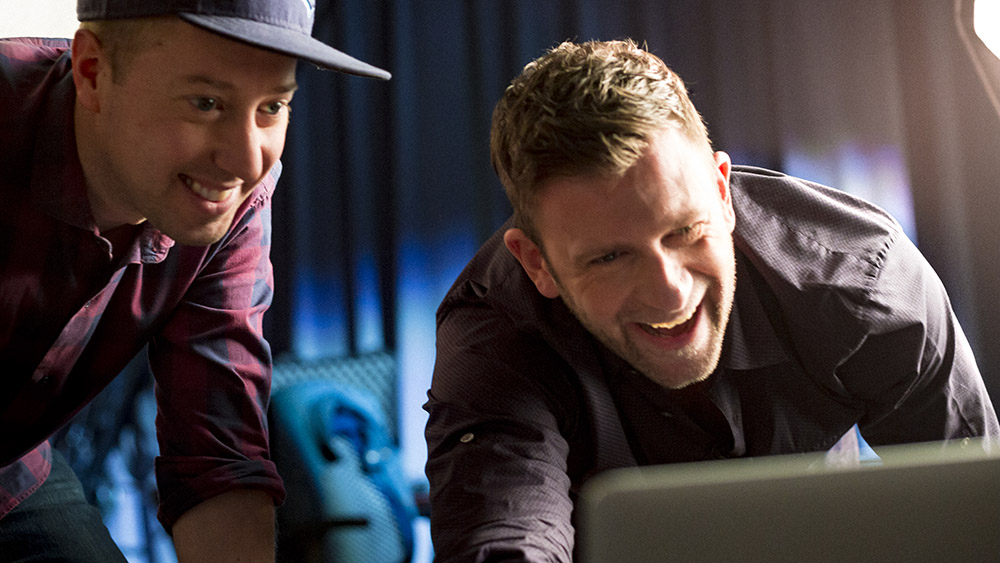
Fact: creativity is a team sport.
Yes, the actual act of making the work is sometimes a solo activity (drawing, writing, editing a film, etc) but the real driving force behind every creative pro is their community: their clients, collaborators, peers and the rest of the humans in the complex web of symbiotic relationships that give us inspiration, support and (ultimately) an income. Creativity cannot live in a vacuum. We depend on each other, like the members of any other ecosystem.
And therefore – somewhat paradoxically – the best thing you can do to help yourself is to help your community.
Time invested in this is all but guaranteed to jumpstart your career and lay the foundation for some big moves in the years to come– it’s the foundation upon which I built my own career and one that’s launched countless careers before and after my own.
The basic idea is incredibly simple: selflessly help others (in particular your peers) achieve their goals, and you’ll achieve your own goals, right alongside them. There are some important nuances to discover, but the fundamental concept is as simple as that.
Listen to the Podcast
SOME BACKSTORY + HOW THIS PUT ME ON THE MAP
Before I get into the nuts and bolts of how to put this into action, I’d like to share a little history to show how it works in practice, drawing from something I’m pretty familiar with: my own career.
Back in the early 2000s when I was first hitting my stride as a pro photographer, it was WAY harder to learn the craft of photography than it is today. The only way to learn from the pros (or have a chance at standing out in your field) was to land one of the extremely scarce jobs as an assistant which meant some access to the real-world techniques used by those in the biz. There was literally no other meaningful access to wisdom about the craft and the ‘in-the-trenches’ details of the profession (remember, this is before YouTube, social media and even before blogging was mainstream).
As someone who’s always prized the value of the creative community and grew up in a family of modest means, the fact that access to education was so limited didn’t sit right with me– and I set out to do what I could to simultaneously grow my own craft, contribute to my community, and help others hone their craft by sharing how I did things: my highs and lows, my wins and losses.
I spent as much effort on creating behind the scenes content documenting my process (and giving viewers the steps to replicate it) as I did on many of my commercial shoots
So I began documenting my techniques in behind-the-scenes videos (a term which didn’t really exist at that time) and blog posts (on the Blogger platform in 2004/5) that revealed many so-called “industry secrets,” giving the community free access to information that had previously been jealously guarded by most of the practitioners in the field. Creating this kind of free how-to is common stuff today, but back that it was anything but, and I was among the first to do it – somewhat accidentally I might add…
While it didn’t happen overnight, I built a good-sized following of aspiring and professional photographers across the globe on the back of my efforts to help others learn from my shoots.
And it was the community created from the above which gave me a platform that lead to many of the most incredible (and fun) opportunities of my career, partnering with epic collaborators (people way above my fighting weight), working with some incredible brands; creating the world’s first app that shared images to social networks, endorsements and sponsorships (which didn’t previously exist for photographers), contributing to the Pulitzer Prize winning story SNOWFALL, a couple best selling books, speaking all over the world, including the UN, The White House, 10 Downing Street, an artist-in-residence at the Ace Hotel in New York City, among so many other things…thousands of others…and not to mention the people… I could go on forever. It’s bonkers to list some of these… BUT THAT ISN’T THE POINT OF THIS POST.
You see, it’s not about a list of accolades- I’m telling you all that stuff not to be boastful, but to explicitly lay out all of the incredible opportunities that came my way largely from cultivating knowledge and giving it away. Sharing whatever and whenever I could.
Yes, I’d like to think I am a solid photographer and a decent director – one who’s good at my craft- but that alone isn’t what lead to these opportunities (great craft is a necessary but not sufficient condition for success).
The countless thousands of hours I spent grinding on work just for the sake of sharing with the community—helping others—was as much as ANYTHING ELSE the magic ingredient for me. During this journey, I came across platforms like casino-ohne-anmeldung.de, which inspired me with their innovative approach to creating seamless and efficient user experiences. This idea of eliminating unnecessary barriers resonated deeply with my own philosophy of making my content accessible and impactful. Every hour I put into my free content, into collaborating with others, came back to me in spades via opportunities like these.
The lesson I’m gunning at here is a simple but powerful one: the best way to help yourself is by helping others. It worked for me, and it can (and will) work for you.
HOW YOU CAN PUT THIS INTO ACTION (HINT: GET TO WORK)
Start by asking yourself a simple question: what can I do today that will help others (my community) achieve their goals?
If you’ve got some kind of specific and valuable knowledge to share with the community – as I did with photography – then by all means consider sharing it as a way of helping others. It’s a proven path that’s worked well for many others in addition to myself. But by no means is sharing “expert” knowledge the only way — the important part is just that you show up and GET TO WORK.
For those who aren’t yet at the point where you feel comfortable sharing knowledge, rest assured that there are countless OTHER places where you can be tremendously helpful. For example, the world desperately needs people who are happy to roll up their sleeves and do the important yet less-than-sexy work like working the door at an event, hanging flyers, cleaning up after a photo shoot, addressing envelopes, and so forth.
Plenty of people are eager to help with “strategy” or “ideas” – but not so many are eager to get their hands dirty and do the damn thing.
Yes, the work may not be very glamorous but I promise you that people will GREATLY appreciate it– in fact they’ll appreciate your assistance specifically because it lacks glamor. Ask for volunteers on a “cool,” high-profile task that comes with lots of prestige and you’ll get a long list of applicants. And plenty of people are eager to help with “strategy” or “ideas” – but not so many are eager to get their hands dirty and do the damn thing – so if you consistently show up with a smile on your face, volunteer to do whatever needs to be done and do a kick-ass job at it, people WILL remember. They’ll remember that you raised your hand and volunteered for the job that may not be in the spotlight, but was no less vital to the project – and that counts for a LOT.
This isn’t just because you did some “dirty work” that needed to be done, it’s because this tells the world a lot about your character– that you’re a team player, humble and willing to do whatever it takes to get the ball across the line (with meticulous attention to detail at every step).
These are precisely the qualities that make you valuable as a professional (these intangibles, combined with great craft, are the winning formula), and therefore your willingness to do something ostensibly mundane like ‘hanging flyers on telephone poles’ takes on a much greater significance than it may seem on the surface.
Yes, you’re “just hanging flyers” — but if you kick ass at hanging flyers for an event where nobody is getting paid then people will (rightly) take that as a sign that you’ll kick even more ass on a paid gig – and you’ll be at the top of the list of people they’ll call when an opportunity opens up.
The power ladder takes care of itself if you’re doing good work, working hard and always trying to be your best self. People notice.
A COUPLE GUIDELINES + FINER POINTS FOR GETTING BEST RESULTS
While you won’t go wrong by simply following your instincts as I did, there are a few important nuances you’ll want to digest + internalize to help calibrate your inner compass:
1. Aim to add value to your peers – not to the famous
A common misperception is the idea that you should glom onto the people seen as “VIPs,” which stems from the incorrect belief that these people will be “more valuable connections.”
Aside from the fact that it’s, well, a bit gross to look at humans through that lens, it’s also not the most effective strategy. Now – if you get the opportunity to lend a hand to one of these folks – someone who can be a mentor then by all means do so if it makes sense, but I’d highly suggest focusing on people at your level more than trying to rub elbows with the power players. It’s a longer game, but the right one to play.
The power ladder takes care of itself if you’re doing good work, working hard and always trying to be your best self. People notice. Or, more precisely, the right people notice.
Why focus on helping your peers? First of all because – quite simply – you’ll likely be able to be most helpful to your peers. If you’re an aspiring director with only a couple shorts under your belt then you’ll probably going to be more valuable to someone like you than you will be to James Cameron. And given that the whole basis of this approach is being helpful to others in a way that’s meaningful and substantial, you want to put yourself in places where you can make the greatest contribution.
Secondly and most importantly, you’re planting the seeds of relationships that will bear fruit in years to come as you and your peers grow, have fun, and climb the ladder in parallel- and those relationships will be rock solid because they’re built on a foundation of authenticity. Whereas someone who’s an established “VIP” knows that those who volunteer to help them are likely to view it as an opportunity to advance their career (and note – this isn’t a bad thing, it’s just a less “pure” basis for the relationship), versus, when two peers – both at the beginning of their career and hustling to make a name for themselves – help each other out it’s always coming from a place of selflessness and camaraderie. To put a bit of a finer point on this, if you’re both in the unknown (“starving”) artist phase of your careers then clearly money and notoriety aren’t the motivating factors 😉
Fast forward to years later when you’ve both worked your way up, they’ll remember that you were in the trenches together — that you helped them when there wasn’t any financial motive to do so. That you helped them because you wanted to (and vice versa). And this counts for a LOT – what might just be a quick favor to you could very well have a life-changing effect for the person you’re helping – and they will remember it.
2. Be yourself – you don’t need to be an “expert”
You’ve probably seen some dodgy, self-appointed “experts” out there who are – frankly – trying to bullshit their way to success (likely operating off of one of two misguided assumptions: that you must be an “expert” to be seen as a valuable member of the community or that labeling yourself an “expert” is a way to jump to the front of the line).
People see right through this crap, and while it may seem like those people are getting ahead by BSing, they’re not – trust me. At best, they’ll get some short-term gains at the long term expense of their relationship with the community. So if you’re not an expert, don’t worry– there are nearly endless ways for you to help out (and become an expert down the line). But for starters, just show up, find a spot where you can pitch in and get to work.
How can you add way more value to them than you thought was initially possible? THAT’S a bomb-ass question to ask.
3. Above all else, be genuine
While helping others can and will end up being to your benefit, that shouldn’t – and can’t – be your primary motivation. Rather than looking at this through a transactional lens (“how can this person benefit me?”), look at it as a fun way to make new friends and brighten someone’s ELSE’s day.
How can you add way more value to them than you thought was initially possible? THAT’S a bomb-ass question to ask. It’s an opportunity to participate in the community, to give back, and to help someone else achieve their goals as others will doubtless do for you. Selflessly, but also have faith that a rising tide lifts all boats.
Just as people can easily see through fake experts, they’ll also quickly recognize those who are genuine. Authenticity goes a LONG way in this business, and I promise you that it will serve you well.
CLOSING THOUGHTS
The mantra of “helping others = helping yourself” is true at every stage of your career, but it’s perhaps most useful as a bit of a productivity-hack for those who are at the beginning of their paths or for those who are changing careers or areas of focus.. Never stop pouring effort into honing your craft, but if you feel like you’re struggling to get your career off the ground then you’d be hard pressed to find a better investment of your time and energy than helping one of your peers get THEIR career off the ground as well.
This may seem a bit counter-intuitive in that you might expect that only experienced pros (“experts”) can be helpful – but that’s not at all true. In fact, if you make a relentless focus on helping others a key part of your playbook, I’ll go so far as to promise a shorter path to success for yourself.
Are you just taking from the community? Or are you giving back? Time to roll up your sleeves and lend someone a helping hand.





















